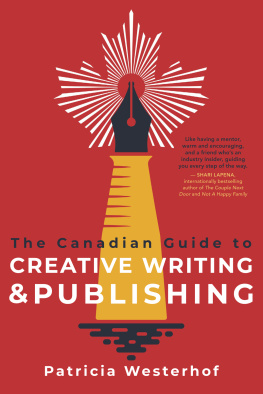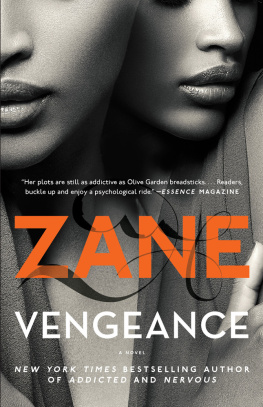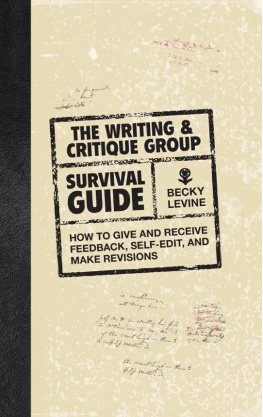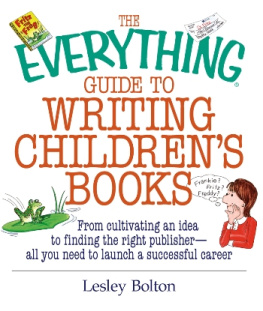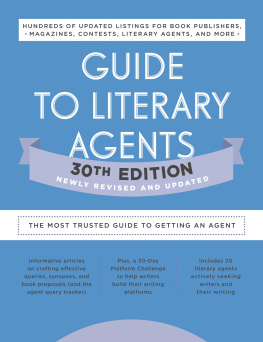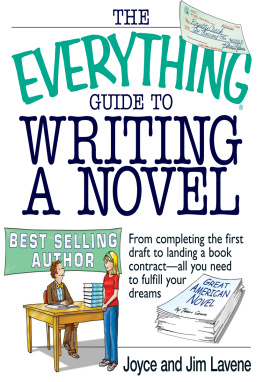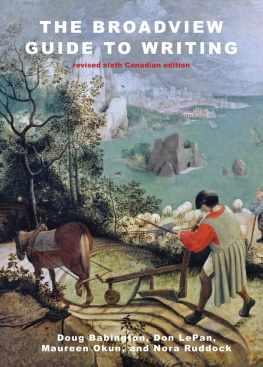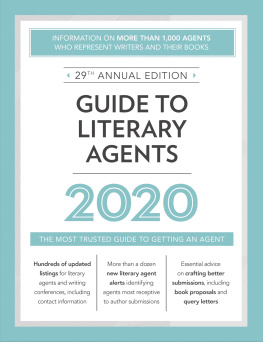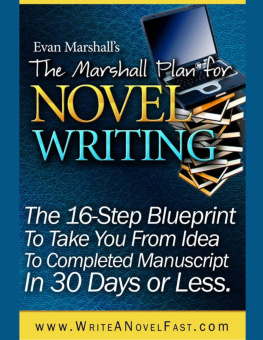Table of Contents
Landmarks
List of Pages
Acknowledgements
First, a thank you to my agent, Meg Wheeler. I wouldnt have written this book if it werent for her enthusiasm when I first mentioned the idea. Im grateful for the time and energy she invested in this book and her help along the way. Thank you to my dear friends and critique partners, Mary Lou Dickinson and Heather Wood, who provided feedback on early drafts, middle drafts, and almost-final versions, not to mention moral support when my energy flagged. Thank you, as well, to my editor, Cy Strom. In , I write that good editors provide insightful feedback and astute suggestions. That certainly is the case for Cy his attention to detail and thoughtful comments made this a better book than I could have written on my own, and he was a pleasure to work with! Thank you to Linda Henshaw for invaluable help with research and to Sue Harper and Greg Ioannou for answering some questions that came up while I was writing the chapter on self-publishing. Thank you to Laurie Miller for copy-editing and to Ashley Hisson for proofreading. To the hard-working staff at Dundurn Press, thank you for turning a Word document into a book, a process that takes many hands, many hours, and great expertise.
I am blessed to have family members who not only cheerlead me when necessary but also lend their considerable skills to my projects. To Tessa, thank you for encouragement whenever deadlines loomed, and thank you for your help with research and data entry in the appendices. My heart leapt with joy when you called me to ask if the task was really as simple as you were finding it I would not have found it so simple. To Peryn, thank you for your enormous help with footnoting, for hunting down the original sources of quotations, and for sharing your encyclopedic knowledge of Chicago style. Your help saved me hours, and it may have saved my sanity, too. To my husband, Douglas, thank you for being my first reader for most chapters and for unquestioningly supporting my writing life all these years. Thank you to my mother, Pat, whose consistent belief in me and my writing ventures lifts my spirits and fuels my work.
Finally, I want to thank the students to whom Ive taught creative writing over the past thirty years. Thank you for bearing with me while I figured out how the content and the skills that I talk about in this book could best be taught.
Afterword: Liking Your Life as a Writer
What do you picture when you imagine the writing life? Is it the life youre currently leading? If not, what would have to change to bring about the vision in your mind? How reasonable and practical are your hopes and goals? How likely are they to come true? If they do come true, will they bring you contentment?
In the late 1950s, the ever-witty American author Dorothy Parker reviewed a now-classic writing guide that had just been published. She wrote, If you have any young friends who aspire to become writers, the second greatest favor you can do them is to present them with copies of The Elements of Style. The first greatest, of course, is to shoot them now, while theyre happy.
The writing life is solitary. It requires more self-discipline and self-criticism than many other careers and pastimes. If you send your work out to magazines and publishers, you can add rejection to the hardships you will encounter. But the writing life also brings joy the pleasure of creating something new, of being engrossed in a world youve invented, of crafting beautiful sentences, of naming some truth, of connecting with an audience, of impacting peoples lives with your words.
If youre going to be a writer, said Alice Munro, youll probably take a lot of wrong turns and then one day just end up writing something you have to write, then getting it better and better just because you want it to be better, and even when you get old and think There must be something else people do you wont quite be able to quit.
Munro rightly supposes that a creative writer will require years of apprenticeship, years of taking wrong turns and working to discover their voice, their genre, their content, their audience. So what can you do to help you to endure and maybe even enjoy the writing life during those years?
Most aspiring authors believe that publication is the path to joy. They long to get published, yearn for an audience and for recognition. Most published authors, however, will tell you that publication does not bring lasting happiness. Seeing ones name in print provides a burst of pleasure and pride, but, like a firework that surges then fades, the feelings soon diminish. Also, writers whose goal is external acknowledgement and reward for their hard work tend to push their own goalposts farther and farther away as their careers develop. Thus, getting their first book published satisfies them, but as time goes by, mere publication is not enough. The veteran writer will set their ambition on making it to a bestseller list, winning a particular contest or award, getting a movie deal, getting a book translated into other languages. In this way, far from helping you to enjoy the writing life, seeking external validation could cause continual discontent.
So where do you find joy in the writing life, if not through publication? The glib answer is through writing, and, for a few writers, writing is its own reward. They relish the act of creation, delighting in each hour they spend at their desks inventing, composing, revising. They take pleasure in having a creative project to mull over in all the spare moments of their day. Such a project stimulates their imagination; it enriches their interior lives; it provides a place to go that is theirs to control. These writers find that writing absorbs their attention in ways no other activity can. They are like mountain climbers who live for the time they spend scaling peaks, or like passionate gardeners whose backyards tug them outside whatever the weather. For these lucky few, the act of writing brings habitual, sustained pleasure.
Many writers, however, dont find writing consistently gratifying. Maybe they find one stage of the writing process agreeable, enjoying composing but disliking revising, or the other way around. Or they like writing more on some occasions than others. Sometimes they slog through sand up to their armpits just to compose a single paragraph, while on other days they gallop along, producing page upon page that requires almost no revision. When the work progresses more smoothly, the process feels better. For these writers, whether writing is arduous or satisfying depends on the day.
Some writers report that they always find writing a gruelling task. For them, the pleasure comes from having written, not from doing the writing. They make themselves stay on task the way a reluctant participant in a fitness class uses willpower and self-talk to keep their feet marching and their arms swinging until the end of the hour. And as that unenthusiastic but dedicated participant takes joy in the results of the workout the improved health and fitness it provides the reluctant writer finds satisfaction in what theyve produced. The misery of the writing process is tolerable because of its outcome.
If you always love writing, then liking the writing life will come naturally to you, whether or not you get published. But if youre like the majority of writers, youve probably already discovered that your joy in the writing life wavers from time to time. Maybe you find yourself getting up from your desk on occasion, thinking that it would be easier and more pleasant to clean your fridge or do your taxes or get a cavity filled than to carry on in your writing project. If youve been sending your work out and receiving nothing but rejections (or silence), maybe you find yourself thinking its time to give up and find a job as a landscaper or a home stager or a cook, some field of work in which the results of your labour are tangible, and people notice your efforts and maybe even thank you. And, if youre already published, then youve probably noticed that the thrill that comes from seeing your name in print is fleeting. You find yourself obsessing about the response and the reviews (or the lack of reviews), and all too soon after one piece comes out, you and your audience will start thinking about what you will publish next.

